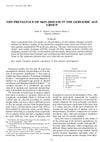 January 2018 in “Springer eBooks”
January 2018 in “Springer eBooks” Gender affects hair and scalp characteristics, with differences in hormone responses, graying patterns, and trace metals.
 May 2015 in “Journal of Investigative Dermatology”
May 2015 in “Journal of Investigative Dermatology” Wnt-3a helps grow more skin stem cells, which could lead to new hair loss treatments.

Hair loss in African American women, caused by hair care, genetics, and environment, needs more research for better treatment.
 127 citations,
December 2005 in “Experimental Dermatology”
127 citations,
December 2005 in “Experimental Dermatology” Stress can stop hair growth in mice, and treatments can reverse this effect.
 66 citations,
January 2000 in “Hormone Research in Paediatrics”
66 citations,
January 2000 in “Hormone Research in Paediatrics” Androgens can both promote and prevent hair growth due to differences in gene expression in hair follicles.
 40 citations,
May 1999 in “Journal of The European Academy of Dermatology and Venereology”
40 citations,
May 1999 in “Journal of The European Academy of Dermatology and Venereology” Treat hair loss with finasteride, minoxidil, or surgery; consider side effects and severity.
 23 citations,
August 1987 in “Australasian Journal of Dermatology”
23 citations,
August 1987 in “Australasian Journal of Dermatology” Older adults in Ottawa commonly have skin conditions like sun damage, dry skin, and hair loss.
 22 citations,
May 2000 in “American Journal of Clinical Dermatology”
22 citations,
May 2000 in “American Journal of Clinical Dermatology” Treatments for common hair loss include minoxidil, finasteride, and hair transplantation.
 21 citations,
October 2009 in “Biochemical Engineering Journal”
21 citations,
October 2009 in “Biochemical Engineering Journal” Stem cell therapy is a promising approach for hair regrowth despite potential side effects.
20 citations,
December 2019 in “International Journal of Molecular Sciences” HB-EGF boosts the hair growth ability of stem cells, making it a potential hair loss treatment.
 18 citations,
April 2021 in “Experimental Dermatology”
18 citations,
April 2021 in “Experimental Dermatology” COVID-19 may cause hair loss and scalp pain due to inflammation and changes in hair follicle receptors, but these symptoms typically resolve in 2 to 4 months.
 16 citations,
December 2019 in “Journal of Cellular and Molecular Medicine”
16 citations,
December 2019 in “Journal of Cellular and Molecular Medicine” Sonicated platelet-rich plasma boosts hair growth by activating stem cells.
 8 citations,
April 2020 in “Facial Plastic Surgery Clinics of North America”
8 citations,
April 2020 in “Facial Plastic Surgery Clinics of North America” Minoxidil, finasteride, and low-level laser light therapy are effective FDA-approved treatments for hair loss.
 4 citations,
September 2020 in “Frontiers in Microbiology”
4 citations,
September 2020 in “Frontiers in Microbiology” Algal oligosaccharides help prevent hair loss and promote hair growth.
 October 2023 in “FASEB bioAdvances”
October 2023 in “FASEB bioAdvances” Akkermansia muciniphila may help prevent testosterone-related hair loss.
 July 2018 in “Elsevier eBooks”
July 2018 in “Elsevier eBooks” Acne keloidalis nuchae is a chronic skin condition more common in African men, causing itchy or painful bumps and can lead to permanent hair loss if not treated early.
 270 citations,
March 2012 in “Dermatologic Surgery”
270 citations,
March 2012 in “Dermatologic Surgery” Platelet-rich plasma can potentially promote hair growth by stimulating cell growth and increasing certain proteins.
 63 citations,
March 1995 in “International Journal of Dermatology”
63 citations,
March 1995 in “International Journal of Dermatology” Some drugs can cause hair loss, and stopping these drugs often leads to hair regrowth.
 6 citations,
March 2014 in “Herba Polonica”
6 citations,
March 2014 in “Herba Polonica” Plant extracts may help treat hormone-related hair loss.
 September 2003 in “Clinics in Family Practice”
September 2003 in “Clinics in Family Practice” Different hair diseases affect people during childbearing years, with treatments ranging from medication to psychological support.
 38 citations,
July 1989 in “Archives of dermatological research”
38 citations,
July 1989 in “Archives of dermatological research” Testosterone causes hair loss in AGA mice, which are good for testing baldness treatments, and both minoxidil and cyproterone acetate can prevent this hair loss.
 7 citations,
January 2019 in “Annals of dermatology/Annals of Dermatology”
7 citations,
January 2019 in “Annals of dermatology/Annals of Dermatology” Synthetic ceramides may help hair growth by boosting cell growth in hair follicles.
 October 2018 in “InTech eBooks”
October 2018 in “InTech eBooks” The most effective treatments for hair loss are minoxidil, finasteride, PRP, and hair transplants, with steroids and immunosuppressants for autoimmune types.
 November 2023 in “Cureus”
November 2023 in “Cureus” Magnetized saline water lotion increased hair growth in men with hair loss.
 67 citations,
May 2010 in “Journal of The American Academy of Dermatology”
67 citations,
May 2010 in “Journal of The American Academy of Dermatology” Some chemotherapy can cause permanent hair loss.
 13 citations,
March 2019 in “Journal of Dermatological Treatment”
13 citations,
March 2019 in “Journal of Dermatological Treatment” Finasteride can treat hair loss, but may have side effects; evaluate and inform patients of risks.
 5 citations,
February 2019 in “The New England Journal of Medicine”
5 citations,
February 2019 in “The New England Journal of Medicine” Certain mutations in the PADI3 gene may increase the risk of developing a type of scarring hair loss common in women of African descent.
 1 citations,
December 2017
1 citations,
December 2017 The study suggests that treating early hair loss with Nourkrin® with Marilex® can help prevent further hair loss and may be linked to reducing the risk of lifestyle diseases.

Hair RiseTM microemulsion effectively promotes hair growth and treats hair loss better than standard treatments.
 October 2007 in “Journal of Investigative Dermatology”
October 2007 in “Journal of Investigative Dermatology” The meeting highlighted the genetic basis of female pattern hair loss and various skin health insights.





























